[70th Anniversary of International Student Education] Yuan Ming: between China and the world
Jul 11, 2022
Editor’s note: The
year 2022 marks 70 years since the inception of International Education
at Peking University in New China. The history can be traced back to
1952 when 14 international students came to PKU through the “Special
Chinese Language Course for Exchange Students in Eastern Europe”. Up
till today, PKU has been continuously enhancing its professional impact
and expanding its global reach, promoting internationalization in
China’s tertiary education. More than 1.1 million international students
have hailed from 195 countries to study on the Yanyuan campus,
enrolling in a wide range of programs. By promoting cultural diplomacy,
exchanges between students of different nationalities facilitate
cross-cultural interactions with hopes of building a Community of Shared
Future for Mankind .
To
mark this special occasion, the Office of International Relations and
PKU News jointly publish the special column “70th Anniversary of International Student Education” to put the spotlight on the history and
achievements of International Education at PKU, and to craft a shared
future for China and the world.
Peking University, July 11, 2022: Yuan Ming, honorary dean of Yenching Academy of PKU and professor at
the PKU School of International Studies, has made great contributions to
strengthening the relationship between China and the rest of the world
for more than 60 years as a scholar and educator. Her publications
include A History of International Relations (1648-1989) and Cross Century Assignment: the International Relations Studies in China . She is also the co-editor of Sino-American Relations (1945-1955 ). Her class The History of Modern International Relations was listed by the PRC Ministry of Education as an Outstanding National Course in 2004. She shares with us her experience as an international student
in the west back in the 1980s, as well as being an educator at Yenching
Academy and welcoming international students to study in China.
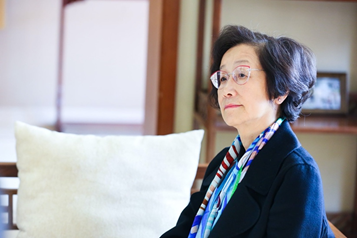 Professor Yuan Ming
Professor Yuan Ming
Yesterday’s world
In 1961, when Yuan Ming still sat in the classroom as a high school student, she would bring a People’s Daily newspaper, which would attract the attention of her classmates. Back in those days, newspapers like People’s Daily were a rare commodity, and the only window for high-school students
like them to see the turbulent and ever-evolving world. Unlike her other
classmates, Yuan Ming was familiar with international politics, which
could be attributed to her grandfather, who studied in Berlin before
World War I. In her childhood, Yuan Ming was fascinated by the legendary
stories of this venerable man—he would spread open a world map, telling
her tales of how he arrived in Germany on the Siberian railway, and how
he worked and studied in Berlin. These stories broadened the horizon of
young Yuan Ming, letting her know that there was a much greater world
that existed beyond her imagination.
In
the summer of 1962, Yuan Ming was admitted to the PKU Department of
Western Language and Literature. At that time, among less than 30
students admitted that year, only 7 of them were foreigners – 3 from
Albania and 4 from the Democratic People’s Republic of Korea (DPRK).
There were also many interesting stories about the campus life back
then. Most notably, Kang Sok-ju, former Deputy Foreign Minister of the
DPRK, used to be the dormmate of Li Zhaoxing, former Foreign Minister of
China at PKU. Kang Sok-ju once expressed his respect to China and PKU
for the spirit of internationalism: “Even in those days of hardship,
China still managed to provide better living conditions to their foreign
students.”
From 1952 to
1966, 1875 foreign students hailed from over 10 socialist countries
including Vietnam, the DPRK, the Soviet Union, Cuba, Albania, and
Mongolia to study at PKU. This offered Yuan Ming a chance to learn what
“one polar” of the world was like. Li Zhaoxing once recalled in an
interview that “an anguished freshman girl claimed that she would change
her major to Spanish to support the anti-imperialist movements of the
Cuban people. I told her languages including English is a tool to
comprehend and change the world. Decades later, she became a renowned
scholar in the field of American issues.” The protagonist of this story
was Yuan Ming. Yuan also immersed herself in the study of Chinese
language and literature, finding herself deeply impressed by the beauty
of classical Chinese literature in the class of Mr. Yuan Xingpei, who
taught the class History of Chinese Literature.
At that time, the young lady had no idea of her occupation in the
future, but perhaps, her mastery of both English and Chinese hinted to
her calling – to link China and the world.
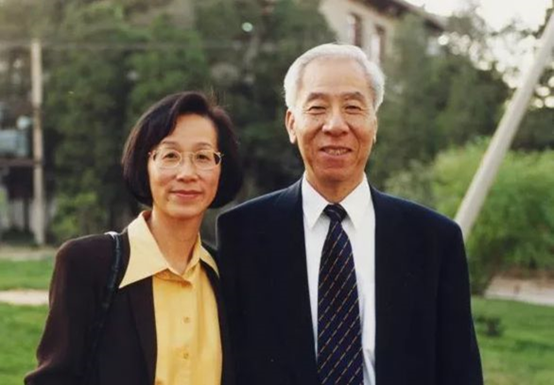 Mr. Yuan Xingpei and Yuan Ming in 1998 (Source: PKU Institute of Humanities and Social Sciences Wechat Official Account)
Mr. Yuan Xingpei and Yuan Ming in 1998 (Source: PKU Institute of Humanities and Social Sciences Wechat Official Account)
Going Faraway
In
the first 10 years after she graduated from PKU, Yuan Ming along with
other youths was sent to rural areas of China to learn from the workers
and farmers as part of the Down to the Countryside Movement . In 1979,
when the Reform and Opening-up policies were implemented, Yuan Ming
returned to PKU and received a master’s degree in International Law.
During the reforms, people were inspired to work and study outside
China. In 1983, Yuan Ming went to the United States as a visiting
scholar at the University of California, Berkeley.
During
this period, Yuan became set on becoming the bridge that links China
and PKU to the world. “We ventured out with a mission to revitalize our
motherland.” In the San Francisco Bay Area, one of the most buzzling
areas in the U.S., Chinese scholars devoted themselves to academia. Yuan
recalled her classmate, Wang Yangyuan , who is a current member of the
Chinese Academy of Science, used to carry out research work in the
Lawrence Berkeley National Laboratory . Wang was extremely committed to
his study, and often pulled all-nighters for good results. Yuan was
deeply inspired by the dedication of Wang and other Chinese scholars,
who worked tirelessly in foreign universities to master the advanced
technologies to bring them to China.
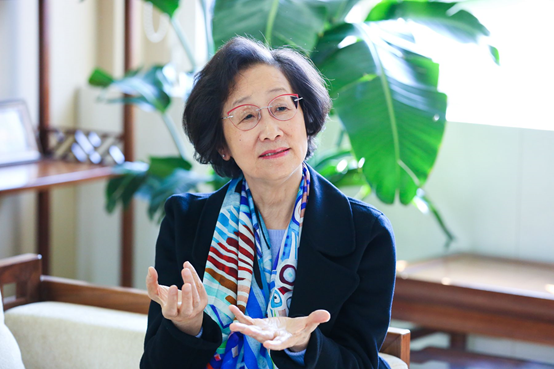 Prefessor Yuan Ming during the interview
Prefessor Yuan Ming during the interview
However,
the wide gap between China and the western world could not be simply
narrowed by the Chinese scholars’ one-sided endeavors to study in the
west. Yuan was disappointed that due to limited interactions between
both worlds, many American scholars have a deep misunderstanding of
China. This spurred Yuan Ming to think “how we can promote mutual
understanding between these two countries.” In Berkeley, Yuan discussed
many topics ranging from the history of China and the U.S. to the Korean
War with the American scholars, aiming to build a bridge through
dialogues. In 1986, after returning to PKU, Yuan initiated the
“Sino-American Relations 1945-1955 Symposium”. “It was made possible
with great difficulty, and PKU managed to invite many young and
middle-aged scholars, who still played an active role in the bilateral
relations between China and the U.S.,” said Yuan.
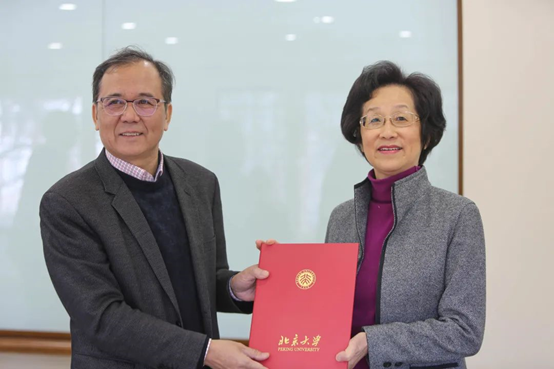 Professor Yuan Ming appointed as the Dean of Yenching Academy of PKU
Professor Yuan Ming appointed as the Dean of Yenching Academy of PKU
Building the bridge
In
2016, Professor Yuan Ming was appointed as the Dean of Yenching Academy
of PKU, which she regarded as a “pure coincidence”. In early 2016, when
Lin Jianhua, former president of PKU, visited her and invited her to
lead the Academy, Yuan accepted it without hesitation. “I said, alright,
I will have a try, and I will do my best to shape inter-cultural
communication, to put the focus on China while embracing the world.”
The
foreign students admitted by Yenching Academy were drastically
different from a few decades ago. They were more privileged in the sense
that they have a more well-rounded understanding of China and the
world, and were well-positioned to draw a blueprint for a shared future
for all humankind. “Firstly, they have received modern academic
education; secondly, they grow up in an era of the Internet, which
broadens their understanding of public issues and international current
affairs; thirdly, they have rich cross-cultural experiences; and
fourthly, many of them are multi-lingual who can navigate cross-cultural
communication easily, and most importantly, they are keenly interested
in China.”
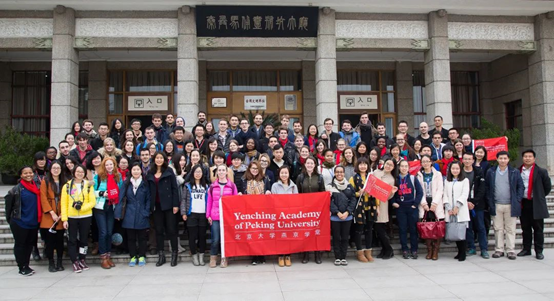 First batch of students in Yenching Academy
First batch of students in Yenching Academy
The
Yenching Academy has nurtured 748 students from over 300 universities
in 82 countries and regions. The students have different skin colors,
mother tongues and cultural backgrounds. This means that only
well-defined curricula and teaching methods can realize the full
potential of international exchanges. “In my opinion, high-quality
research of China must be underpinned by a deep understanding of the
Chinese culture. To realize this, we must empower our students to
contextualize their knowledge learnt in classrooms to real-life settings
in different areas in China.” That was how the compulsory course of
Yenching Academy – China in Transition
– was crafted. To accommodate the interests of the students, Yuan Ming
conversed with many students to better understand their preferences, and
constantly redesigned the curriculum to cater to their needs. The
Yenching Global Symposium held in spring every year is also one of their
flagship events. It provides a platform for youth around the globe to
share their research experiences in China. Every year, hundreds of young
scholars would participate in the symposium, sharing their research
findings and views on the development of China in all aspects.
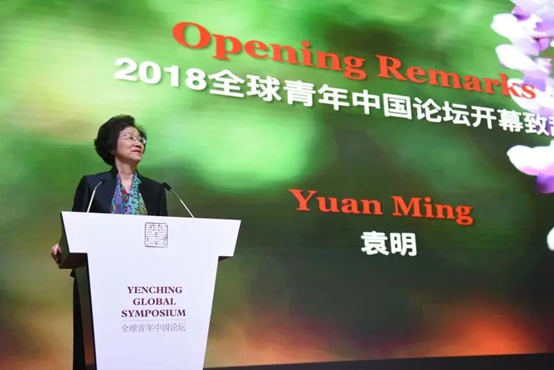 Professor Yuan Ming delivering Opening Remarks during 2018 Yenching Global Symposium
Professor Yuan Ming delivering Opening Remarks during 2018 Yenching Global Symposium
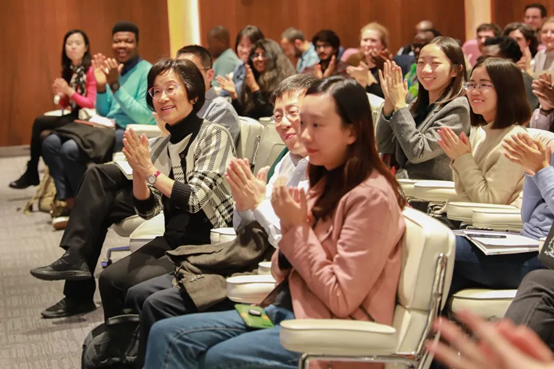 Professor Yuan Ming interacting with students
Professor Yuan Ming interacting with students
“How
can we build mutual understanding?” This was the question Yuan Ming has
pondered ever since she ventured out of China to pursue her education
in a foreign country. In the ever-evolving state of international
affairs, the bridge linking China and the world beyond is even more
imperative. Students would graduate from Yenching Academy with
compassion for world affairs and bicultural exchanges, which is the
fruition of Yuan Ming’s devotion to nurturing a new generation of
students with both Eastern and Western perspectives.
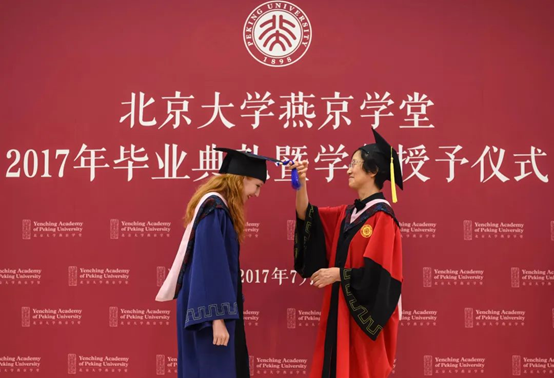 Professor Yuan Ming and Graduates of Yenching Academy
Professor Yuan Ming and Graduates of Yenching Academy
Written by: Bai Qingwen
Edited by: Shi Xinyao, Hu Rong
Source: PKU News (Chinese)







